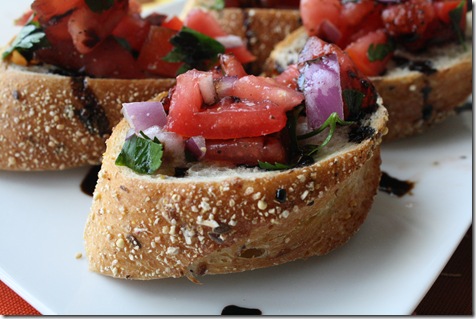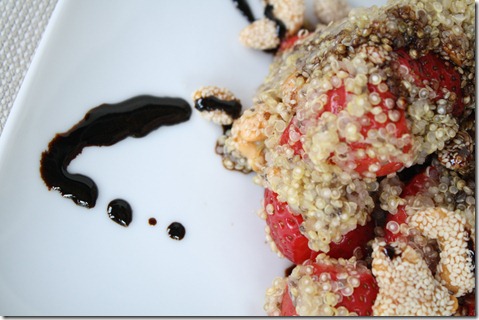Two and a half years ago, the Husband and I went fully vegetarian. I try not to make my vegetarianism a ‘big deal’ on the blog because – to me – it’s simply the way I decide to eat. Since it is relevant to the rest of the post, I’ll quickly sum up our motivations for going vegetarian:
I went vegetarian because I read the book Skinny Bitch (here’s my full review of this controversial book). The section of Skinny Bitch that really, really hit home for me was the description of slaughterhouses. Not all animals are raised in horrible conditions, and I know there are many ‘good’ farmers out there, but I really do not believe there is a guaranteed way to humanly slaughter an animal. There’s a line in Skinny Bitch that goes something like this: “When you eat an animal, you are eating pain and suffering.†Super guilt-trippy (that’s kind of Skinny Bitch’s style) but… it made sense to me. It rang true to me. Another major motivator of my vegetarianism is the environmental cost of the meat industry (this New York Times article on that subject is extremely interesting).

(Summer Bruschetta with Balsamic Reduction)
Now, I want to acknowledge something very important: I am really not a high-and-mighty vegetarian. As of 2.5 years ago, I chowed down on multiple servings of meat every single day. Meat tastes good. Steak is freaking DELICIOUS. I do not ‘look down’ on meat eaters (sadly, some vegetarians do this – some vegans even do it to vegetarians! – but I think this ‘my diet is better than yours’ mentality is completely counterproductive to the cause). I do not believe that everyone should go vegetarian because food is intensely personally, and if vegetarianism is not your thing, that’s cool with me. I do believe that everyone should, however, try to eat less meat. As Americans, we eat far too much meat, and it is bad for the animals and the planet. Our meat consumption is also exacerbating our nation’s health crisis (in terms of heart disease and cancer).
A few months ago, I was listening to the radio and the announcer said, “Coming up next – wait until you hear which celebrity is inflicting a craaaazy diet on her toddler!†After the commercial break, I was informed that the ‘crazy diet’ was actually vegetarianism. The announcer was freaking out that the kid had never eaten meat. That was my first clue that people were going to question our decision, too. So I wasn’t surprised that, since announcing my pregnancy, one question that the Husband and I have gotten a lot is, “Are you going to raise your kid vegetarian?â€
The answer: of course we are. I really can’t imagine serving my child food that I choose not to eat. I also cannot imagine spending my money to support the industry. When the time comes to explain vegetarianism to our kids, I plan to simply point to the family dog and say, “Hamburgers come from cows. Nuggets come from chickens. Cows and chickens are animals, just like your doggie. Our family chooses not to eat animals because we love them, even if they live on a farm and not in our house.†Just the facts.

(Strawberry Fields Breakfast Quinoa)
The first follow-up question that people ask is, “But don’t kids NEED meat to grow?†The answer: absolutely not. The American Dietetic Association (ADA) says that vegetarian (or vegan) diets are “healthful, nutritionally adequate, may provide health benefits in the prevention and treatment of certain disease,†including heart disease and cancer (source). A vegetarian diet, according to the ADA, is appropriate at all lifestyles, including during pregnancy, infancy, and adolescence. The ADA says there are particular nutrients that vegetarians need to be mindful of, including “protein, n-3 fatty acids, iron, zinc, iodine, calcium, and vitamins D and B-12,†but a vegetarian diet – especially if it includes dairy and eggs – can easily meet all current recommendations for these nutrients through a balanced diet, fortified foods, or supplements.
The next question that people ask me is: “But don’t you think your kids will feel weird? Or hate you for making them vegetarian?†And this is actually the only issue that concerns me. I don’t want my children to feel like freaks at the lunch table for eating a hummus sandwich; only 3% of American youth between the ages of 8 – 18 are vegetarian (source). Our friend Isaac was raised vegetarian and says he was often teased because of it. I also don’t want my children to feel resentment towards vegetarianism because it was something mom and dad “made†them do.
That’s why we’re planning to approach our children’s vegetarianism in a surprising way… If my kid eats meat at a friend’s house, I won’t care. If they want to try it when out at a restaurant, fine by me. I won’t serve them meat in the house, but that’s where my strictness will end. I do not want to push any beliefs, whether it be about politics or religion or food, on my children. I think it’s important to not create resentment or fear about certain foods, and like I said, I think food is highly personal, and we all have to draw our own conclusions about our diet. That right extends to my toddler or tween or teen, too.

(Butternut BBQ Personal Pizza)
When I was a teen, I went vegetarian for the first time. I was so nervous that my mom would be mad at me, but instead, she supported my decision and bought me a vegetarian cookbook so I could learn to feed myself in a healthy way. I’ll never forget how it felt to have my dietary beliefs supported by my family.
As a vegetarian mom, I want to balance what I believe to be true and my child’s autonomy. Navigating the difference between what our family believes in and what the majority of society endorses will certainly be a journey…. but at the very least, I plan to make it an extremely tasty experience for BabyHTP!
Other vegetarian posts:
Now it’s your turn to weigh in: What food beliefs do you plan to introduce to your children? Are you a vegetarian or vegan parent? If so, what do you do when your child eats at a friend’s house?

Well, its really none of my business whether you choose to eat vegetarian or your kids either.
You likely would not like my opinion anyway because I strongly disagree with vegetarianism.